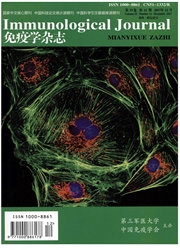

 中文摘要:
中文摘要:
HIV是导致AIDS的病原体,HIV感染后会引起机体免疫缺陷并导致多个器官的损伤,其中肠道损伤是HIV感染后最常见的病变之一。肠道损伤既是HIV致病的直接诱因,也能间接地影响机体多项免疫功能进而加速疾病进展。非人灵长类动物在组织结构、免疫、生理和代谢等方面与人类具有高度相似性,而且在SIV感染后的发病过程和病理特征与人AIDS症状非常相似,故其作为HIV研究的模型动物被广泛运用。本文对SIV感染非人灵长类所致的肠道组织病理变化,免疫细胞及分子的变化,肠道菌群及易位对AIDS的影响,以及治疗对肠道损伤的作用等方面研究进展进行介绍。通过对SIV感染后组织病理学和免疫学变化的认识,将有助于了解艾滋病发病机制,研发抗HIV药物和疫苗以及研究病人的治疗策略。
 英文摘要:
英文摘要:
HIV is the pathogen of AIDS and can cause immunodeficiency and damage to organs.Gastrointestinal(GI) injury has been commonly seen in patients with HIV infection, which is the major pathogenic mechanism of AIDS, and also induces immune dysfunction and accelerates disease progression. Non-human primates show highly similarity with human beings in organizational structure, immunity, physiology and metabolism. The disease process and pathological characteristic in SIV infected nonhuman primate models shown closely resemble HIV infection and AIDS, so they have been widely used as the animal model for studying HIV infection. In this review, we summarize the histopathologic changes of GI tract, the variations of immune cells and molecules, effects of gut microbiomes and translocation on AIDS, the role of therapy on GI injury. Studying the histopathologic and immunologic changes of SIV infection will help to study the disease mechanism, develop antiHIV drugs and vaccine, and also benefit the treatment of HIV infection.
 同期刊论文项目
同期刊论文项目
 同项目期刊论文
同项目期刊论文
 Dynamics and functions of CD4?CD25 (high) regulatory T lymphocytes in Chinese rhesus macaques during
Dynamics and functions of CD4?CD25 (high) regulatory T lymphocytes in Chinese rhesus macaques during Flow cytometric characterizations of leukocyte subpopulations in the peripheral blood of northern pi
Flow cytometric characterizations of leukocyte subpopulations in the peripheral blood of northern pi The effects of TRIM5α polymorphism on HIV-2ROD and SIVmac239 replicationin PBMCs from Chinese rhesus
The effects of TRIM5α polymorphism on HIV-2ROD and SIVmac239 replicationin PBMCs from Chinese rhesus The recombinant maize ribosome-inactivating protein transiently reduces viral load in SHIV89.6infect
The recombinant maize ribosome-inactivating protein transiently reduces viral load in SHIV89.6infect The effect of exon 7deletion during the evolution of TRIMCyp fusion proteins on viral restriction,cy
The effect of exon 7deletion during the evolution of TRIMCyp fusion proteins on viral restriction,cy Longitudinalanalysis reveals characteristically high proportions of bacterialvaginosis-associated ba
Longitudinalanalysis reveals characteristically high proportions of bacterialvaginosis-associated ba Analysis of the levels of immunoglobulins, complements and CRP in serum of captive northern pig-tail
Analysis of the levels of immunoglobulins, complements and CRP in serum of captive northern pig-tail Diverse forms of HIV-1 among Burmese long-distance truck drivers imply their contribution to HIV-1 c
Diverse forms of HIV-1 among Burmese long-distance truck drivers imply their contribution to HIV-1 c A splice variant of HLA-A with a deletion of exon 3 expressed as nonmature cell-surface glycoprotein
A splice variant of HLA-A with a deletion of exon 3 expressed as nonmature cell-surface glycoprotein Dynamics and functions of CD4(+)CD25(high) regulatory T lymphocytes in Chinese rhesus macaques durin
Dynamics and functions of CD4(+)CD25(high) regulatory T lymphocytes in Chinese rhesus macaques durin Aged Chinese rhesus macaques suffer severe phenotypic T- and B-cell aging accompanied with sex diffe
Aged Chinese rhesus macaques suffer severe phenotypic T- and B-cell aging accompanied with sex diffe 期刊信息
期刊信息
